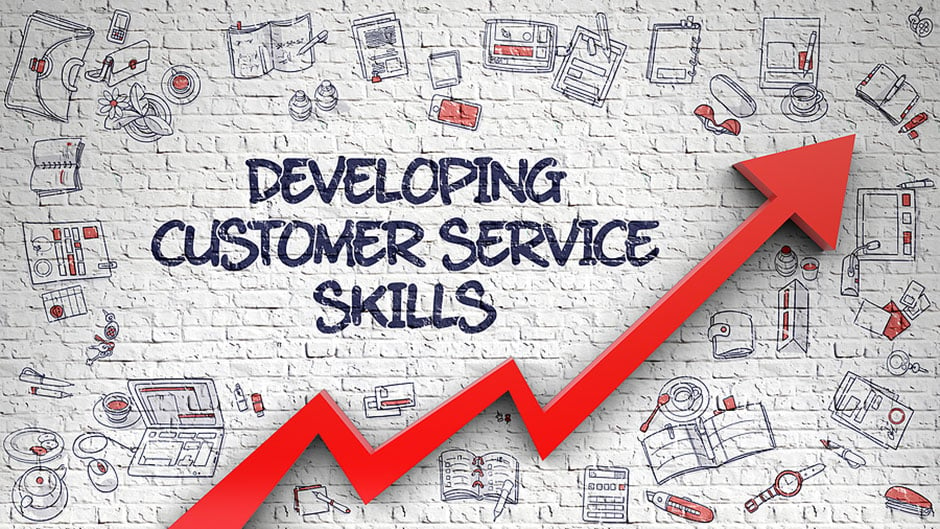Written by Sean McPheat | 

Having good customer service is the hallmark of any successful business.
But how can you deliver good customer service? The answer is that you need to ensure you have the relevant customer service skills to provide an excellent experience to your customers every time.
So, what is meant by good customer service skills? There are a number of specific skills that relate to customer service. Fortunately, good customer service skills can be learned and improved upon, and in this article, we will go over what those skills are, why they are important, and how you can improve in this critical area.
If you’re a salesperson you need to deliver superior levels of service to your prospects and customers so these tips will really help you to achieve just that.

Good customer service skills are important for many reasons.
First and foremost, if you don’t have them, you will be unable to provide the best service to your customers, which will negatively affect your business either pre or during your post-sale follow up. However, if you take the time to learn and improve your skills, you will be able to improve customer relations, secure repeat business, and ultimately grow your business in a much more positive direction.
In fact, customers who receive good customer service spend, on average, 140% more than those who receive poor customer service. Also, consider that 83% of customers require some form of customer service before making a purchase. In other words, if you want to remain competitive, having good customer service skills is vital to your success.
So, what skills exemplify “good customer service?” Let’s go over ten of the most important customer service skills and look at why they are so vital to delivering a positive customer interaction.
Keep in mind that the following customer service skills are not an exhaustive list; they are simply some of the most important ones that any good customer service agent or salesperson will be able to demonstrate during every interaction with a customer, whether that be on the phone, in person, or online via chat or virtual meeting.
Being able to communicate clearly, concisely, effectively, and politely is, without a doubt, the most important customer service skill. If you are unable to communicate in this fashion with your customers, then you will certainly lose a ton of business and will quickly gain a negative reputation in your industry.
Empathy means being able to put yourself in the shoes of your customer. From a sales perspective, this means being able to anticipate what your customer wants and needs before they have to tell you. However, many customer service interactions have to do with complaints or grievances; being able to understand why the customer is upset and empathising with them is the first step towards being able to resolve their complaint in a manner that is satisfactory to the customer, which is ultimately your goal in this scenario.

Knowing how to adapt and adjust your demeanour is imperative if you want to deliver good customer service. Customers will throw all sorts of things at you throughout the course of a conversation, and you need to be able to respond to each one of their sales objections, questions, and requirements on the fly. If you are unable to adapt to the customers changing attitude throughout your interaction with them, you will be unlikely to succeed in delivering good customer service, and your chances of making a sale will dramatically decline.
Improv acting skills are very relevant in customer service. Knowing how to switch up your character, personality, tone of voice, demeanour, and overall presence, is an important skill to have both in sales and when interacting with customers in a customer service role. Different buyer types demand different things, and what satisfies one customer will dissatisfy another. Knowing how to think on your feet and act differently with different customers at a moment’s notice is critical to being successful in any customer service role.

Timeliness is another vital customer service skill that you need to have in your repertoire if you want to deliver the best customer service experience. If you leave your customer waiting, are inattentive to their needs, or fail to respond to their queries in a timely fashion, they will certainly be dissatisfied, and you can bet that they will voice that dissatisfaction to anyone who will listen. Aim to respond to your customer’s needs instantly or as close to instantly as is possible given the specific situation.
Realise that when you work in customer service, you are, for all intents and purposes, the company from the customers perspective. As such, you should have a deep and thorough knowledge of all of the products and services being offered by your company. If you don’t know the answer to a customer’s question about a product that your company offers, the customer will think negatively of the company as a whole and will most likely decide to do business with one of your competitors who knows the ins and outs of what they are selling to the public.

Besides having good communication skills, being patient is perhaps the most important trait you need to cultivate if you want to deliver good customer service. Customers reaching out for support are very often frustrated, ill-tempered, condescending, and many times outright rude.
Customers may yell at you, swear at you, or otherwise be very rude to you, seemingly for no reason. It’s important that you don’t respond to them in the same way as they are treating you.
Instead, understand that they are not upset with you as a person, but rather they are upset with the company that you represent. When this is the case, be patient. Let the customer know that they are right, that you understand why they are upset and that you would be upset if you were in their position, and that you will do everything you can to resolve the situation to their satisfaction.
By acting in this way, the customer will, in most instances, view you as a human and not a faceless company, which should de-escalate the situation, allowing you to get on with your job in a constructive and positive way.
Dependability is also incredibly important when working in customer service. You need to be consistent with how you interact with customers. It’s not okay to deliver great customer service one day and lackluster customer service the next.
Your mindset must be always on point. Regardless of how they treat you, every customer needs to be always treated with respect. It’s important that you leave any personal problems at home with you so that you can be in the right frame of mind to deliver great customer service regardless of what’s going on in your personal life.
Likewise, you will have days when you deal with irate and rude customers all day. It’s important that you don’t take it personally or take that negative energy home with you.
You need to leave all of that bad energy at work and switch your “home mode” on at the end of the day; this is another reason why improv acting skills are so relevant in the customer service industry.

Customer service is very often about problem-solving. The best customer service representatives are able to anticipate, identify, and resolve the customer’s problems before the customer ever even tells you what the issue is that they’re experiencing. In most cases, this comes down to having adequate technical skills with respect to the systems and services you use at work.
Being able to quickly look up information you don’t know without ever telling the customer that you don’t know is vital to success. Knowing how to navigate the computer software you use to review and adjust customer account is also imperative. You need to be able to multitask when dealing with customers, and the name of the game is always problem-solving.
Last but not least, you need to be able to demonstrate sincerity, especially when you are not sincere. When a customer is rude to you, then you need to be able to say, “I’m really sorry that you are feeling this way, and I will do everything in my power to make sure that this gets resolved for you right away,” even though there are probably a few other, less polite things you’d love to say. You need to come across as being always genuine and sincere, which is a customer service skill that needs to be trained and cultivated.

Chances are that if you are just starting out in customer service, then you may not have all of these skills. Even if you think that you do have a firm grasp on all of these skills, rest assured that you do not. There is always room for improvement, and even the best customer service representatives in the world can improve in one or more of these areas. In fact, the very best customer service agents are the ones who know that they have room to improve in all of these areas. So, how can you improve your customer service skills? Let’s look at that now.
There is a big difference between hearing somebody and really listening to them. Active listening means not waiting to respond or formulating a response in your head when the other party is still speaking. Rather, it means giving your whole attention to what the other party is saying before responding. In this way, you will be able to fully grasp what the other person wants and needs from you. Practice this in your daily life. The next time you catch yourself thinking of a response when someone is talking to you, stop and clear your mind, give your entire attention to listening to them and then respond with a probing questions that asks for more.
Attend any telephone sales training and you’ll understand the power of using positive language. Using positive language when interacting with people is a vital skill to have, not just in customer service but also in life. Try to incorporate affirmative words in the sentences that you construct; this will rub off on the other party, and you will notice that this can de-escalate hostile interactions and will increase the likelihood of there being a positive outcome in many of the situations you encounter, particularly when dealing with customers.
As mentioned, it’s crucial that your technical skills are top-notch so that you can resolve customer concerns, look up information, and respond quickly while interacting with customers. Knowing how to navigate the various computer programs or other relevant technical systems that you rely on at work is one of the best ways to ensure that you can deliver excellent customer service every time.
Ultimately, customer service is all about finding solutions. If you can anticipate the customer’s problems and find solutions, you will succeed as a customer service agent. Remember, oftentimes, the customer may not even realise that they have a problem. The key to sales is showing them that they do have a problem and then immediately presenting them with the solution, but that’s a lesson for another day. For now, just remember to focus on finding solutions, and you’ll be on the right path. Improving your negotiation skills is something we’d always recommend because it’s all about give and take – essential skills for customer service.
Finally, don’t be afraid to admit your mistakes. In fact, admitting mistakes is something you should do often, especially in customer service. By admitting that the company made a mistake or that you were wrong about something, you can help the customer see you as a person, and this is the most important step you can take to ensure a positive, amicable interaction. That said, it’s not enough to admit that a mistake was made; you still need to present a solution that rectifies that mistake. Let the customer know that they are right and that you’ve taken X, Y, or Z steps to resolve their concern, this will make them feel understood, and its key to delivering good customer service.
How good are your skills? Take our Sales Skills Assessment and find out.

In the UK our levels of customer service are appalling in my opinion. In the US consumers are happier than ever!
Well, that’s according to a 2017 Customer Service Barometer study jointly conducted by American Express and Ebiquity.

The PwC surveyed 15,000 people from 12 countries through online surveys and in-field interviews in 2017/2018. 4,000 people were from the US and 11,000 were from 11 other countries, namely Argentina, Australia, Brazil, Canada, China, Colombia, Germany, Japan, Mexico, Singapore and UK.
The analysis found that offering great consumer experience is crucial for increasing consumers value spending, brand advocacy and brand loyalty. The detailed output from this study is below:
Overall:
US:
Overall:
US:

So, what customer service skills will we need that will set us apart from others in the future? Here are some thoughts:
This means we must see service as the baseline for what we are offering customers. Their choices will be much wider than now, so just offering the product at the right price will only get you onto the ballpark, not win the game. People will expect to enjoy more than just a transactional service provider.
People will measure your service through the experience they enjoyed
What makes Disney continuously at the top of the pile when it comes to customer feedback? It’s not just the products and services they offer; anyone could provide the customer with a hotel bed and a theme park.
What they offer is an unforgettable experience that makes customers have the time of their lives. Think of service as being exactly that; the providing of an experience that will be remembered for the right reasons.
What is a customer touch point? It’s anytime a customer has contact with your company.
It could range from your marketing messages, through to your website, to the condition of your premises from the outside to the way customer enquiries and complaints are handled, right through to the way the product works when they have bought it.
Every touch point is an opportunity to build loyalty and your customer service skills can enhance each of those interactions, many of which you have little or no control over, like customer comments to others on your Facebook or Twitter page.
All your Sales Training programmes should also cover customer service skills.
Being exceptional is a mindset. It means you decide to be excellent whenever you are in contact with a customer or prospect. You decide that average, good or even very good are not acceptable words in your customer service dictionary.
You choose to be exceptional when you go beyond expectations. You follow up on that call when you didn’t need to. You give that bit extra to ensure a customer’s delivery is on time. You spend a little more time on ensuring the details are precisely correct. You accept responsibility for excellent service and don’t let anyone distract you from that goal
What are good customer service skills? Well, one definition may be to accept responsibility to make the customer experience memorable. So, when something goes wrong, or customer service falls a bit flat, what does a professional do?
They become accountable and accept that they are there to make it right.
If you are dealing with complaints, for example, how can you show you are responsible and make it right?
Here are some tips:
But don’t forget all good customer service representatives should have an equal quality of soft skills.
Customer service skills are developing all the time. Be prepared to change and evolve with the needs and demands of customers, and then you’ll provide experiences that will go beyond expectations and be memorable.
Taking courses such as Essential Selling Skills Training, Sales Management Training and Account Management Training is a great place to start!
Delivering good customer service can be the difference between success and failure in business. Although it may sound like common sense, customer service requires a number of skills that need to be cultivated and constantly improved upon. By paying attention to the customer service skills that we’ve gone over in this article, you will be able to deliver a better experience to your customers every time you interact with them, which will help you in your career, and in your life outside of work.
Happy Selling!
Sean

Sean McPheat
Managing Director
MTD Sales Training
Updated on: 16 August, 2023
Originally published: 3 May. 2023
Related Articles

Search For More
